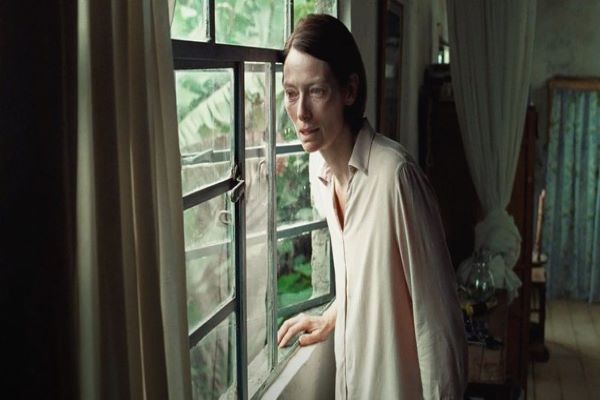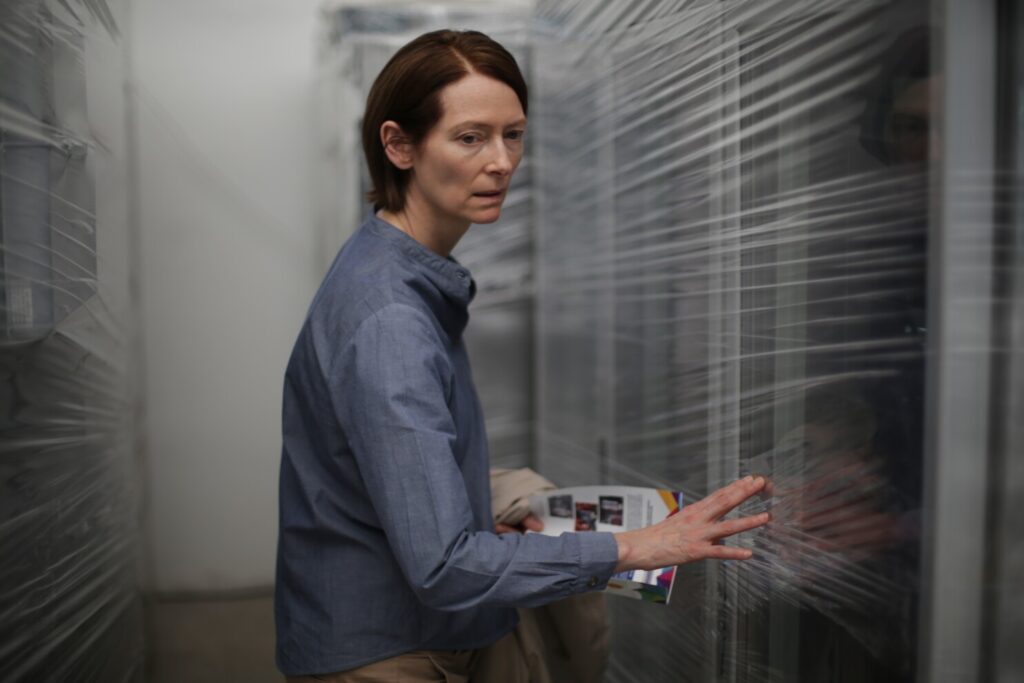Apichatpong Weerasethakul’s deeply meditative film Memoria is mostly driven by sound. The protagonist of the film Jessica (Tilda Swinton) suffers from the exploding head syndrome and because of that, she hears a sudden loud boom sound very often and sometimes at odd times like while sleeping at midnight. Initially, she is not able to realize that only she hears this sound and nobody else. This problem makes her restless and she ends up investigating further the source of the sound. However, Memoria is not only about a Scottish expatriate’s inquisitive search for the boom sound that makes her uneasy but also about her desperate search for her existence and identity. The film highlights the differences between city and village life, the differences amongst global cultures, parallel lives, shared memories, and unity and connection amidst global diversity. It vividly shows how memories can merge and how two completely unknown individuals can deeply bond together. Memoria clearly points out that a person can be dislocated with significant struggle and Trauma, but definitely not disconnected.
A Scottish expatriate to Colombia and flower merchant named Jessica lives in Medellin where she wakes up at midnight to a sudden loud boom sound. She feels uneasy but is not sure whether she alone hears this sound. The next day, Jessica visits her ailing sister Karen in a hospital in Bogota. A little later, she goes to see the excavation project in that hospital. She again hears the same loud boom sound while having dinner with her sister Karen, who has just recovered from her illness, and her husband Juan. Now, she is quite sure that only she hears this sound and nobody else. Jessica sometimes loses memory and can’t remember all the incidents. However, she is determined to investigate further and track the sound source. She visits a young sound engineer named Hernan (Juan Pablo Urrego) to create the same loud boom sound that she repeatedly hears. After quite a few attempts, he is able to create the same sound. Jessica shares a friendly relationship with him. However, quite surprisingly, the sound engineer vanishes when Jessica visits the sound studio. The employees tell her that there is no one named Hernan. She leaves the studio sad and surprised.

Jessica sets out for the countryside to investigate further on the sound source. She reaches a remote area beside a canal and surrounded by mountains and jungle. There, she meets and befriends a fisherman also named Hernan (Elkin Diaz). Hernan is seen scrapping scales off the fishes. Jessica and Hernan bond really well and they find out coincidentally that they share the same memories. They become very close to each other and hold hands. Jessica approaches the window and hears the same loud boom sound again. She is no more scared of the sound and starts living with it. A camouflaged alien spaceship suddenly takes off from the jungle. A radio announcement is heard about an earthquake that unearths some excavation sites.
Through Memoria, filmmaker Apichatpong Weerasethakul has shown how a dislocated individual finds a connection with a completely unknown individual in a very different place. When a human being is in terrible shape and almost shattered, he or she desperately needs a helping hand. When Jessica suffers from the exploding head syndrome and frequent memory loss, she suffers from an existential and identity crisis. She can’t even share her mental trauma with her sister and brother-in-law. At first, she shares it with the sound engineer Hernan and then the fisherman whose name is also Hernan. The film shows that no matter how much devastated we are, we can definitely find solace in companionship.
Jessica and Hernan happen to share the same memories. This is astounding how two completely unknown individuals from two different parts of the world can share the same memories. Through this sequence, filmmaker Apichatpong Weerasethakul has raised and highlighted an important issue. Each part of this world has its own history and culture. In that sense, the world is very much divided and separated. In spite of so many differences, all these distinct cultures and histories merge with each other and celebrate the idea of one world, one dream. World unity can’t be formed unless and until we hold hands and work together. Two completely distinct persons from two different corners of the world can dream the same dream. No matter even if Jessica and Hernan are from two different countries, they are two connected and associated citizens of this global village.

Memoria is enriched with a plethora of sounds. The protagonist of the film Jessica hears a loud boom sound and ends up investigating further in rural Colombia. Apart from the boom sound, there are many other sounds clearly audible in the film. Viewers clearly hear the pitter-patter sound of rain, the chattering of birds, the sudden cosmic sound of the spaceship, etc. The use of different sounds is the most important aspect of this film.
Filmmaker Apichatpong portrays the differences between the city and village life through Memoria. The vibes of city life are much different than the tranquil village life. If the city life is full of hustle-bustle and chaos, the village life is surrounded by natural beauty and calmness. Like his previous films, Memoria too vividly points out the contrast between urban and rural lifestyles and cultures. The filmmaker personally is deeply touched and inspired by rural life. So, there is no surprise that he will bring this aspect in his films as well. However, he does not despise urban life. Both lives have their own identity and significance.
Memoria does not have a proper narrative structure and multiple scenes are not interlinked at all. The film is mostly devoid of music. However, it demands the attention and patience of the viewers. The film is full of long takes and wide-angle long shots. Apart from a few scenes, it does not have many dialogues at all. However, the reward lies in the philosophical setting and concept of the film. Tilda Swinton brilliantly portrays Jessica’s medical problem, trauma, restlessness, inquisitiveness, constant search for her existence and identity, and her connection to this world. Filmmaker Apichatpong Weerasethakul has made this film like a form of meditation and not merely a story. Memoria was screened in competition and won the Jury Prize at the 2021 Cannes Film Festival. The film has received global recognition and critical acclaim.
